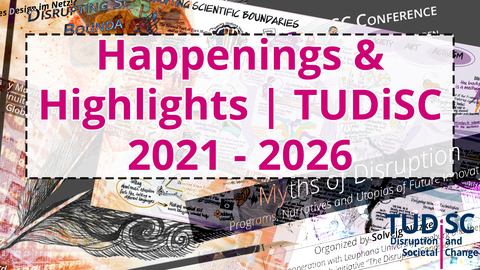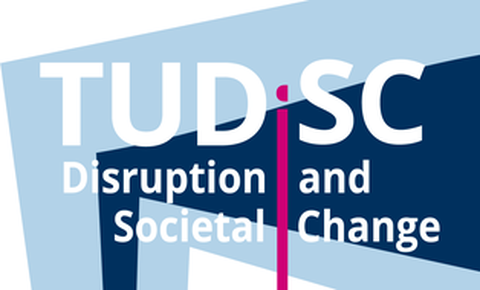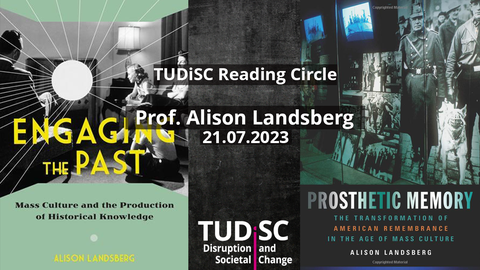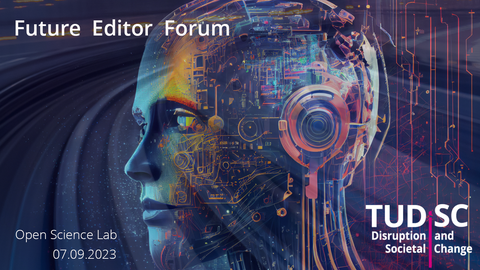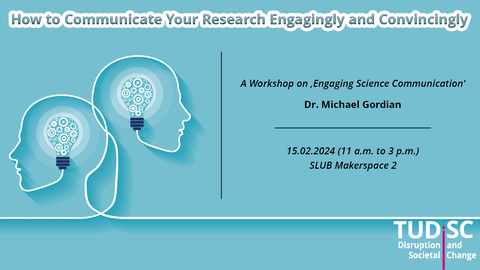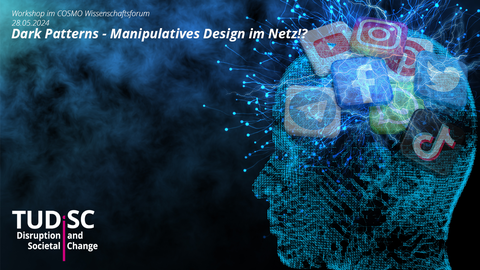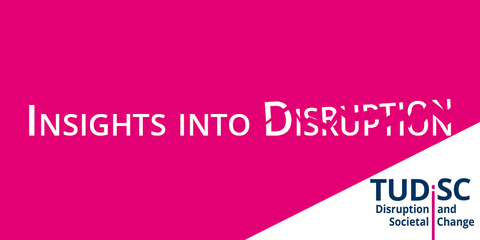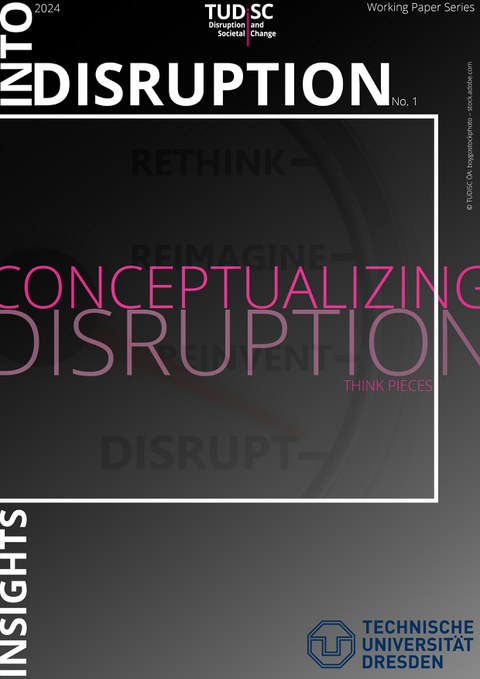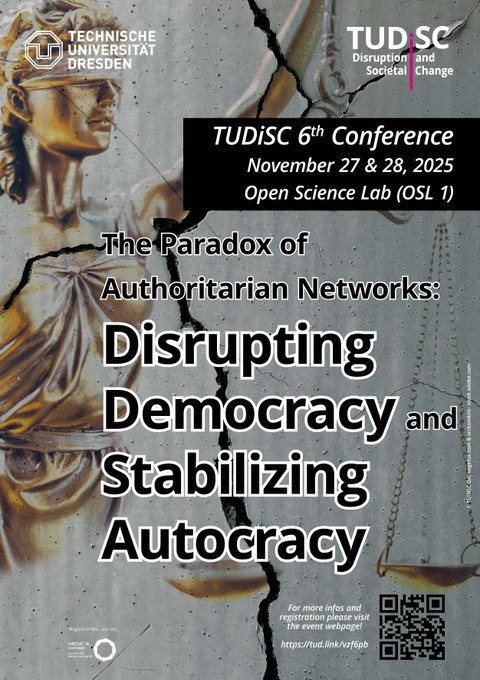Veranstaltungen & Highlights | Research into Disruption & Societal Change
Research into Disruption & Societal Change
An Exploration into Interdisciplinarity
Zusätzlich zu den hier aufgezeigten Veranstaltungshöhepunkten finden Sie auf den Unterseiten:
ein Veranstaltungsarchiv mit einer Sammlung all unserer Veranstaltungen seit Start des Forschungsverbundes
eine Rückschau auf unsere 5. Verbundskonferenz "Disrupting Scientific Boundaries" 2024
eine Einladung zur 6. Verbundskonferenz "The Paradox of Authoritarian Networks: Disrupting Democracies and Stabilizing Autocracy"
Inhaltsverzeichnis
Highlights & Milestones
2021
Where It All Began
On July 7, 2021, the TUDiSC Kick-Off was held, featuring presentations of the joint projects and discussions on the conceptual and content-related cooperation within the network, along with various aspects of coordination among its members. Following the initial developments, on July 15, 2021, TUDiSC was presented during a visit by State Minister Gemkow under the theme "Digitalisation for Humans." This event showcased TUDiSC within the framework of the ministerial visit as part of the "Application and Responsibility" program item. Subsequently, on October 5, 2021, the TUDiSC Set-Up Workshop took place, where the projects were introduced with a focus on their thematic areas. The workshop also emphasized the network's future perspectives and facilitated discussions on potential work formats moving forward.
2022
TUDiSC 1st Conference: Disruption Under Observation
From March 31 to April 1, 2022, the "Disruption under Observation" conference was held as the first TUDiSC conference, a two-day event led by the projects DiaDisK, DIPCY, and Disrupt!Research, featuring guest speakers Martina Schober and Regina Franzen. To mark the founding of the network a logo was specially made (see below), incorporating the colours of the School of Humaniteis and Social Sciences, which has accomanied us ever since.
TUDiSC 2nd Conference: Systems of Agency in Face of Disruption
The 2nd Conference, titled "Systems of Agency in Face of Disruption," was held from October 12 to October 14, 2022. The three-day event was hosted by the projects TPM, HumGlobal, Designate, and DOUbT. A highlight of the conference was a public keynote address by Julia Wittmayer on October 13, which focused on disruption and agency from a sustainability transition perspective. This conference explored the concept of disruption through a critical lens, emphasizing the importance of understanding systems of agency during crises. It examined how disruptive experiences were embodied and situated, challenging habitual perceptions and practices, investigating how power dynamics influence whose disruptions are acknowledged and how agency is distributed among humans and nonhumans within complex systems. It also considered how infrastructures shaped opportunities for action and transformation. By analyzing the pathways from awareness to action, the event aimed to foster disruptive practices that challenged hegemonic norms, highlighting the collective and relational nature of agency in creating more sustainable and equitable futures.
2023
TUDiSC 3rd Conference: Disruptive Worldmaking: Technology, Design, Art
The 3rd TUDiSC Conference, held on March 16 at the SLUB Open Science Lab in Dresden, successfully explored the theme of "Disruptive Worldmaking: Technology, Design, Art." Directed by Orit Halpern and Lars Koch, the event welcomed a diverse audience and featured inspiring presentations that delved into innovative intersections of creativity and technology. Chris Salter from Concordia University presented on research-creation and the role of nonpropositional knowledge in shaping public engagement. Johannes Bruder from the University of Applied Sciences Northwestern Switzerland offered insights into critical media, examining their influence on contemporary discourse. Jens Krzywinski and Lenard Opeskin discussed designing mobilities, highlighting new approaches to movement and accessibility. The conference concluded with a thought-provoking presentation of the book The Smartness Mandate by Orit Halper and Robert Mitchell from Duke University, leaving attendees with fresh perspectives on technological disruptions and their artistic and societal implications.
Network Exchange and Learning: Reading circles
Alongside the traditional forms of exchange and opportunities for learning, such as the international conferences and platforms for presentation, TUDiSC has also regularly organised more intimate settings. Once such example is a reading circle that was held with Prof. Alison Landsberg on July 21, 2023. Prof. Alison Landsberg discussed her renewed interest in disruption as an ever-present concept in her work, viewing it as a moment of consciousness that aims to interrupt linear history and critically engage with the present. She highlighted mass culture as a key site of disruption and credited Walter Benjamin as her muse, especially his ideas on materialist history and the revealing power of photography and film. Landsberg focused on dialectical images, which challenge traditional historicism by emphasizing the interconnectedness of past and present, shaping a different kind of future through their interaction. She illustrated this with the TV series "Lovecraft Country," which connects historical racial violence, like Emmett Till’s murder, to contemporary issues, demonstrating how the present is rooted in a history of racism. The reading circle was well attended across the TUDiSC subprojects and created an environment for new (external) input and rich discussion.
Future Editor Forum
The traditional formats of scientific publications, such as academic journals and books, are not keeping pace with the possibilities offered by digital technologies. While some journals may have accompanying podcasts or social media channels, the written print format (or PDF) remains the primary means of publication. However, digital dissemination is changing the way science is communicated and is expected to transform both the structure of society and the functioning of science itself. The question arises as to how digital publishing can be developed beyond simply providing a PDF of an article, incorporating various modalities and formats that reflect the dynamic nature of research and its processes.
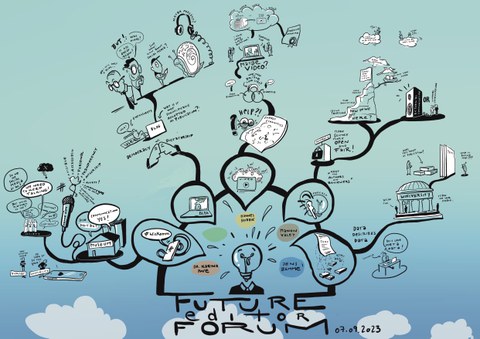
A Graphic Recording from the Future Editor Forum Lightning Talks
The Future Editor Forum, organized by the TUDiSC subproject Disrupt!Research, took place on September 7, 2023, and brought together potential future editors to discuss how to integrate internal and external science communication and what consequences digitalization would have for science communication. This endeavour was also reflected in the innovative form of capturing the day's discussions and explorations through a graphic recording, instead of the typical minute-taking.
TUDiSC 4th Conference: Myths of Disruption
The fourth TUDISC conference, "Myths of Disruption. Programs, Narratives and Uptopias of Future Innovations" held from December 6 to 8, 2023, provided a lively platform for discussions on disruptive topics, despite snow chaos, strikes, and rail strikes. High-profile keynotes by Kylie Crane and Adrian Daub, as well as a diverse range of presentations, shed light on disruption from various disciplines and international perspectives. The conference was divided into panels that addressed topics such as digital transformation, copyright in AI, historical and neoliberal disruption, decolonial perspectives, political and social dimensions, everyday practices, and moral questioning. Of particular note were engaging discussions on the culture of disruption, colonial narratives, logistics, human displacement, and the role of morality in processes of change. Daub's closing keynote reflected on Silicon Valley's ambivalent attitude toward disruption. The event was made possible by dedicated support and funding, in particular from the Disrupt!Research project.
2024
Network Exchange and Learning: Engaging Science Communcation
In today’s fast-paced digital world, effective research communication is crucial to stand out. On February 15, 2024, young researchers at TUD attended a workshop organized by TUDiSC with Dr. Michael Gordian on engaging research presentation. The session covered strategies for clear introductions, storytelling techniques, and the use of figurative language to simplify complex ideas. Participants practiced pitching to a general audience and received feedback. The workshop also emphasized structuring presentations with audience-focused questions and improving body language and tone. Overall, it provided valuable insights into making research more accessible and impactful, fostering confidence and communication skills for future dissemination.
Dark Patterns - Manipulative Design on the Web
People frequently use the internet to book trips, watch entertaining videos on YouTube, and scroll through Instagram. Much of what once cost money—such as magazine information or correspondence with friends—now appears to be quickly accessible and free. However, this is often only an illusion; instead of paying with money, users pay with personal data, time, or attention. Many websites employ "Dark Patterns"—design techniques that obscure information, capture attention, or push purchasing decisions—to achieve this. This workshop from the TUDiSC subproject Designate, which was held on May 28, 2024 at the COSMO Science Forum in Dresden, provided insights from legal and psychological perspectives on the forms, effects, and regulation of Dark Patterns. Participants actively discussed where they have experienced manipulation online, whether they have taken any action against it, and explored additional strategies for protection. The event sought to examine these issues and potential solutions collaboratively.
TUDiSC 5th Conference: Disrupting Scientific Boundaries
The TUDiSC 5th conference in Dresden centered on the theme “Disrupting Scientific Boundaries,” beginning with an engaging keynote by Dr. Enno Fischer that challenged traditional notions of scientific limits through diverse case studies. The event featured a full day of dynamic exchanges, starting with lightning talks where participants shared perspectives on topics like democracy, corporate influence, inclusive education, AI datasets, and performance art, fostering broad interdisciplinary dialogue. The conference's highlights included World Café sessions, divided into "Artistic Dimensions" and "Societal Implications," encouraging in-depth discussions on issues such as racial politics in science fiction, objectivity in education, dissent in authoritarian regimes, social movements, and AI ethics. A notable feature was a collaborative graphic recording by Franziska Schwarz (see below), visually capturing the day’s insights. Overall, the conference successfully brought together diverse disciplines, fostering reflection and collaboration on the evolving boundaries of science.
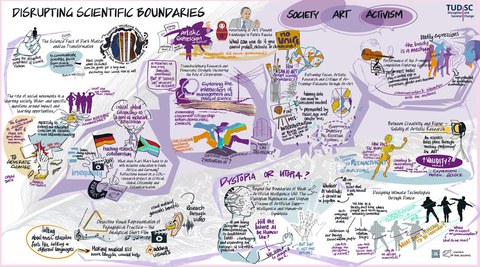
Graphic recording by Franziska Schwarz
TUDiSC Open Access Publication Platform: Insights into Disruption
After much preparation and planning, the open access publication platform "Insights into Disruption" was launched by TUDiSC in September, 2024. To mark its launch, a series titled "Conceptualizing Disruption" was published.
This ongoing series looks to provide a space for exchange and continual examination of disruption from a conceptual standpoint. These first releases were the result of a workshop at the Open Science Lab in which TUDiSC researchers from various backgrounds came together to showcase think pieces, in the process exchanging conceptual perspectives and struggles. In the background of the cover we see a kind of countdown or speedometer, revving up to disruption. With each think piece our understanding gets a little closer to its full potential, and as the think pieces themselves shape the world around them, so too do they themselves have a disruptive potential.
2025
TUDiSC 6th Conference: The Paradox of Authoritarian Networks
Looking Back and Moving Forward
As we look back and reflect on the undertakings, achievements and challenges of the TUDiSC network over the last years, we also move forward with another exciting international conference. Join us at the 6th International TUDiSC Conference in November 2025, where the focus is on authoritarian networks and their impact on global politics. Discover how these intricate connections enable illiberal actors to thrive within democracies and autocracies alike, disrupting institutions and eroding public trust. Leading experts will explore the vital role digital tools play in shaping these networks, revealing how they collaborate worldwide to amplify their messages and strategies. Over two engaging days, delve into questions about who the members are, what drives their formation, and how these networks operate across different levels. This event offers a unique opportunity to gain insights into current authoritarian challenges, connect with like-minded individuals, and explore ways to strengthen democratic resilience in a rapidly changing world. Don’t miss out on this exciting event in Dresden—your voice and participation are essential!
Find out more here

